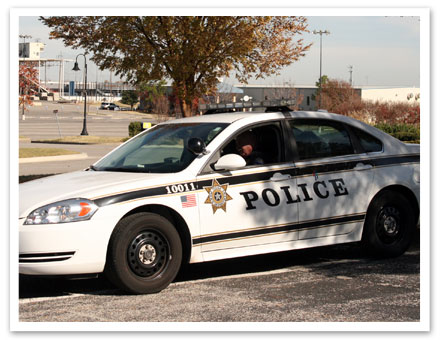There are many reasons you could be stopped by a police officer. Maybe you committed a minor traffic violation without realizing it. Sometimes there’s a problem with your vehicle you didn’t notice, like a burned out brake light, or maybe your vehicle is similar to one used in a serious crime. Whatever the reason, it’s important to remain calm and know your rights during a traffic stop.

You’ll see flashing emergency lights behind you when an officer wants to pull you over. You have to pull over and stop your vehicle as soon as it’s safe to do so. Here are some tips for what to do when you’re being pulled over:
- Slow down, engage your turn signal, and pull over as far to the right side of the road as you can. Never attempt to avoid law enforcement by speeding off or making a quick exit onto another street.
- Once you’re stopped in a safe place, turn off your vehicle. Turn your interior lights on.
- Roll down your windows about halfway, then place your hands on the steering wheel. Officers may approach from the driver’s side or the passenger’s side.
- Do not reach for any objects until the officer specifically asks you to do so, even when they are still in their vehicle. Passengers should keep their hands in plain sight as well.
It’s vital that everyone (i.e., law enforcement officers, drivers and passengers) remain calm during a traffic stop. Drivers and passengers should not exit the vehicle unless asked to do so by the officer. Exiting the vehicle unprompted could be seen as aggressive behavior and a threat to the officer’s safety.
Drivers and passengers should not reach for their license or insurance documents before or while an officer is approaching. Wait until the officer asks for your documents, then tell them where the documents are located before you reach for them. Some states allow drivers to provide digital proof of insurance, or even a digital driver’s license. Even so, you should always keep physical copies of these documents with you as well.
Drivers who transport firearms in their vehicles are encouraged to keep these in a separate location from their license and insurance documents. If you have firearms in your vehicle, calmly inform the officer of their location.
The driver and any passengers are subject to an investigative detention during a traffic stop, which may only last for a reasonable amount of time. Passengers can ask the officer if they are free to leave and do so if the officer consents. Law enforcement may ask questions during this time. You may inform the officer that you wish to remain silent; however, drivers are legally required to display a driver’s license when requested to do so by an officer.
Law enforcement may ask you if they can search your vehicle. You are allowed to refuse this request and ask to speak to an attorney first. If an officer has probable cause to believe that your vehicle contains evidence of a crime, however, it can be searched without your consent. If an officer reasonably believes that you have a weapon, the officer can conduct a pat down search of your person and the immediate area around you, including areas of your vehicle.
You cannot physically resist a search, but you can let the officer know that you don’t consent to the search.
If you believe an officer has acted inappropriately during a traffic stop, write down everything you remember immediately following the interaction. You should report your experience to the officer’s superiors and follow agency guidelines for submitting complaints against officers as soon as possible.
You shouldn’t argue with an officer during a traffic stop. Signing a citation doesn’t mean you’re admitting guilt. It simply confirms your promise to pay the fine or contact the court. If you think you did not deserve the citation, you can argue your case in court, not during the traffic stop.
Most traffic stops go smoothly and without conflict, but it’s important to understand your rights and responsibilities during a traffic stop and remain calm.
Are you interested in traffic safety?
Are you looking for defensive driving and traffic school courses? Do you want a discount on your auto insurance? Do you know a teen who’s ready to take an online driver education course?
Safe2Drive is here to help! We offer convenient online courses for drivers of any age! Visit our website today to learn about the online courses we offer in your state.